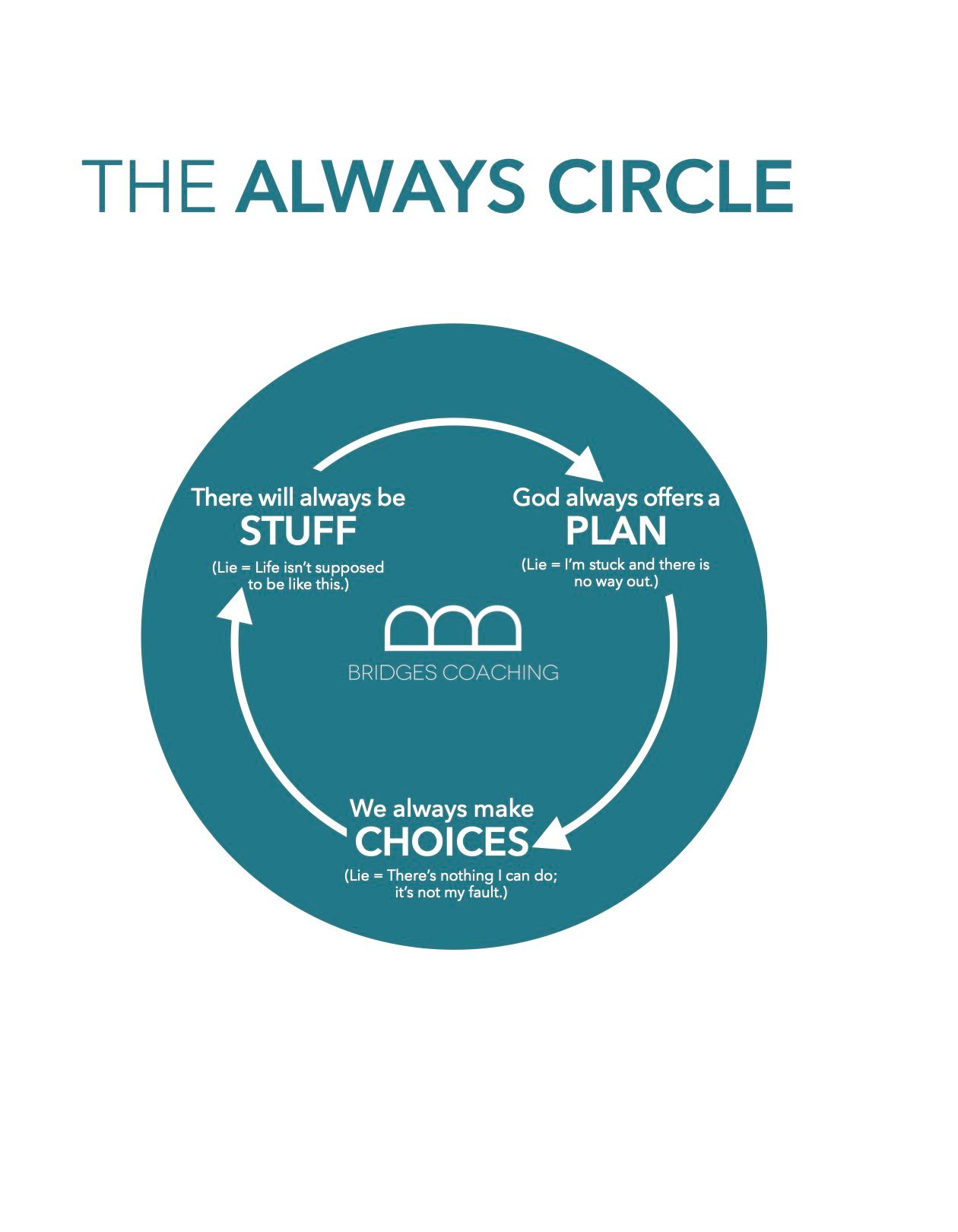6 Ways to Get Unstuck
Everyone feels stuck in life at one point or another. Some of you may feel stuck right now.

Miss Havisham from Charles Dicken’s novel, Great Expectations, is a classic example of what it means to be stuck.
After being jilted at the altar by her groom, Miss Havisham insists on wearing her wedding dress for the rest of her life while her ruined mansion falls down around her.
She can’t move beyond her heartbreak. She is stuck. Here’s how I define “stuck” for the purpose of this blog:
Stuck – the inability to move forward in life.
We can get stuck for many reasons – a traumatic event, unexpected grief, hopelessness, loss, or failure. Then there’s age. Often the older we get the less flexible we become.
Whatever reason you may have for being stuck (and it may be a valid reason), you don’t need to stay there.
Help, I’m Stuck!
As 2017 came to a close, I felt really stuck. If I’m honest, I had been feeling that way for a few years before that. After 8 years of church planting and not seeing the results I had hoped for, I was really disillusioned, but as it turns out, I was exactly where I needed to be to move forward. It wasn’t until that point that I was able to see things clearly and begin to turn the ship in the right direction – both in the church and personally.
After two years of this, things felt different, but not enough.
I just couldn’t shake this nagging thought. You know the one, There must be more than this, right?
It was then that I decided to pursue a long-time dream of getting my coaching certification. That set in motion a series of decisions that led me to a better place. With the help of the program and my coach ( shout out to Sarah Fulton ), I realized I had believed in a lie.
The lie was, “I’m stuck and there is no way out. There is nothing I can do.”
The truth was, “God always offers a PLAN, and we always make CHOICES!”
Cindy Scott, the founder of Bridges Coaching calls it “The Always Circle” (used with permission). In her book, Traction , she uses the principles of Life Coaching – including The Always Circle, to help people get unstuck.

The truth was I had CHOSEN to do what I was doing because I believed it was what God wanted. I wasn’t stuck, I had made a choice.
That changed everything for me.
I no longer saw myself as stuck and powerless. I had a choice.
And if I made one choice, I could make another.
At the time, I felt that because I was leading a church, I couldn’t start a business. I’m not sure why I thought that way, after all, I had worked other jobs for years while pastoring the church, but for some reason, starting a business felt like it was off-limits. I could either lead a church, or start a business, but I couldn’t do both. That was the false narrative I was telling myself. It took a while to understand that and unpack what was behind it, but once I did, I was able to make a decision.
I chose to start a business as an author, speaker, and coach. I was already an author and speaker, so I did my coaching certification in 2019 and started the business in 2020!
Start with Today
Though I certainly don’t have it all figured out, I’m closer than I was. There are still days I wonder how it’s all going to fit together, but instead of trying to figure it all out, I remember I am only responsible for the step…the choice if you will…that is right in front of me. And I choose to keep stepping. This quote has helped me a lot over the last several months:
Yesterday is gone. Tomorrow has not yet come. We have only today. Let us begin. (Mother Theresa)
In the process of starting the business and working on some collaborative projects with others, I realized that I get energy from innovating, pioneering, and creating new things – whether writing books and blogs or creating programs and courses – when I’m not regularly creating, I feel stuck.
After discovering that, I feel happier in my work life than I’ve felt in years. I feel fresh and vibrant.
6 Ways to Get Unstuck
After much trial and error, here are several things I’ve learned about getting unstuck:
- Let it go. It’s not just the title of that annoying song from the movie Frozen that our kids ran around singing 24/7, it’s a way of life. What do I mean by “Let it go?” Forgiveness of course. An unwillingness to forgive puts you in prison, not the other person. Forgiveness doesn’t mean you let people hurt you over and over; it means to acquit, dismiss, or leave unpunished. You’re not the judge and jury. And while It’s OK to remove yourself from a damaging or hurtful situation or relationship, rehearsing what someone has done to you over and over only damages you. There is a place for acknowledging that someone hurt you and grieving over it. Sometimes, it is also appropriate to let the other person know they hurt you, but that may depend on their willingness to hear and understand you. Otherwise, it can just cause more pain. Either way, forgiveness is not optional – at least if you want to move forward in life! How many times should you forgive someone? One time, three times, seven times? According to Jesus, 70 x 7 times! If you’re not good at math, that’s 490 times…per person! And by the way, I don’t think he meant you can stop at 491. I think his point was, forgiveness doesn’t have a limit.
- Never stop learning. Always be teachable. Let’s face it. Each of us has a limited perspective. Other perspectives (including those that aren’t like ours) aren’t just good, they are crucial to our growth and development. If you don’t welcome diverse opinions, you will find yourself in an echo chamber with those who think, talk, and sound like you. No one is saying you need to agree with every perspective, but it is good for us to hear and understand diverse viewpoints. Like Saint Francis prayed, “Grant that I may not so much seek to be understood as to understand.” I really believe part of the reason we find ourselves in such a polarized climate right now in our culture is that we are stuck in our own echo chambers, and we put more emphasis on being heard than on understanding. True understanding takes empathy and a lot of practice. I’ve been enjoying this book by Michael P. Nichols, Ph.D. The Lost Art of Listening. You could also hire a trained coach or go see a counselor. The two practices can work together but are different in their approach. Make sure you know the difference (I explain some on my coaching page ). Sometimes you just need a push, some encouragement, a listening ear, someone who can ask good questions to help you talk it out, or another perspective.
- Flip the script. Do something unexpected or different. Every so often, we need to change something. Author Mark Batterson says, “A change of pace + a change of place = a change of perspective.” Over the years, I’ve found that to be true. When my usual routine gets stale and stagnant, I change something. It doesn’t have to be something big, in fact, it can be a very small change. For example, I like to sit in my grandmother’s rocking chair while I think and pray. But sometimes, I just can’t focus, so instead, I take a walk and it seems to get the creativity flowing again. I also love to take personal retreats (and I think you should consider taking one too). A retreat allows me to get out of my normal routine and environment to write, think, pray, and plan. I am never disappointed with the results.
- Do something that scares you. In the same vein of doing something different, it’s also good to do something totally new. Do something that scares you a little bit or something that is a little bit risky. Learn a new skill. Take a class. Go skydiving. Start a side-hustle. Do something you’ve never done before. It’s hard to find who actually said this, but you’ve probably heard the quote, “Do one thing every day that scares you.” While it may not be realistic every day, doing something out of your comfort zone is necessary to get unstuck. I recently heard an interview with leadership expert John Maxwell where He said, “Everything you want but don’t have is outside of your comfort zone.”
- Give people permission to challenge you. New York Times bestseller and organizational psychologist Adam Grant calls it a “Challenge Network.” “A Challenge Network is a group of people we trust to point out our blind spots and help us overcome our weaknesses.” To be sure, we also need a support network – or a network of people that are supportive and encouraging, but they aren’t usually the ones who will point out our blind spots. Whether it’s a few people you reach out to from time to time or a formal group of people you give permission to challenge you, we all need others who care about us but aren’t enamored by us. People who are willing to tell us what we can’t…or won’t see about ourselves.
- Make a choice. “You are one decision away from a totally different life” (Mark Batterson). If you don’t like your life, you have a choice. Is it really that easy? Yes and no. I won’t go deep into this one since I already shared my story, but simply put – choices are powerful. Different choices require different approaches. Some choices are easy and others need prayer, research, discernment, and wise counsel, but at the end of the day, you are responsible for your own choices. You will make mistakes but never make the mistake of choosing apathy. By not choosing, you are actually making a choice. Not exercising your ability to choose means you are choosing to stay stuck.
You Choose
What do you need to do to get unstuck? Try picking ONE of the 6 Ways to Get Unstuck and define ONE step you are going to take this week to get unstuck using a SMARTER Goal.
Go ahead. Make a choice. I dare you!
Photo by Carlos Magno on Unsplash
Share this Post:











